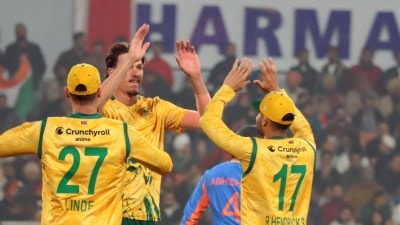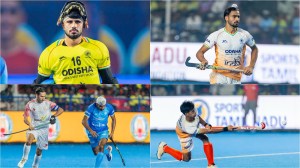A kargil memorial in the time of war
Captain Anuj Nayyar17 Jat, Maha Vir ChakraWe won Kargil but have Pakistan’s evil designs failed? We need answers EVERYTIME he sees an a...

17 Jat, Maha Vir Chakra
We won Kargil but have Pakistan’s evil designs failed? We need answers
‘‘Even three years later, his fiance refuses to marry anyone else,’’ she says. The family is still trying to cope with the grief. Anuj’s father, Satish Nayyar, a professor at Delhi School of Economics does not feel like teaching anymore. And at 22, Anuj’s younger brother, Karan, is already philosophical about life, war and death.
‘‘We are at the brink of another war. What will this war achieve and what did Kargil achieve? Pakistan has not mended its ways and now, besides the soldiers at the border, even their families in the cantonments are not safe. This is very demoralising,’’ says Meena, the head librarian of Delhi University’s south campus library. Time has failed to heal their wounds or fill the void. ‘‘We shifted from our house in Janakpuri since everything there reminded us of Anuj. But Anuj’s memories still fill us with pain,’’ she says.
But under all this pain is a feeling of pride as well. ‘‘He did what he had to do for the nation. He was born to die for the country and his 17 Jat battalion. He did them both proud. Anuj also did us proud. But does the nation not have a duty towards him and other martyrs. After all what did they sacrifice their lives for?’’ asks Anuj’s father.
‘‘Has the situation in Jammu and Kashmir changed? Is the place safer for the people and the armed forces? Has Pakistan’s evil designs failed? There is a need to find the answers. Why has Kargil failed to achieve its aim? Why is Pakistan still in a position to create havoc in J&K within months of the Kargil conflict? We must try and find out where we went wrong in our Kargil and post-Kargil strategy and ensure the mistakes are not repeated,’’ he adds.
GAURAV C. SAWANT, New Delhi
I feel Kargil was incomplete. We shouldn’t give Pak the benefit of time
But he has no regrets. ‘‘I often wish I was in my 20s and a soldier. I want to go where my son made the ultimate sacrifice and carry on his work. I also want to go to Kargil one day and see the spot and touch the soil where his blood fell,’’ says the 56-year-old health assistant.
‘‘War is a bad thing…I have lost my young son at Kargil. Hundreds of people like me have also lost their sons. Yet, another war is inevitable. When I look back at Kargil, I feel it was incomplete,’’ he says.
Father of 11 children, of whom Neikezhakuo was the eldest, this Naga wants the government to ensure that ‘‘we should not just win the war but also ensure that in the future no more wars take place on the Western front.’’
Echoing her husband, Dinuo, says: ‘‘I feel a war should not take place but I see on television that Pakistan is adamant. That country is not responding to peaceful efforts. Thus we should prepare well and fight.’’
Their fourth son, Keneitsilie, a second-year BA student, adds: ‘‘We should not give Pakistan the benefit of time. We should strike immediately. It has already been identified as a terrorist country. Pakistan has to be crushed.’’ Considered closest to Neikezhakuo, he reveals that ‘‘sometimes, something inside me tells me to join the army and fight like my brother.’’
Samudra Gupta Kashyap, Kohima
18 Garhwal Rifles
War, no war? All I can say is that people will die
HE has become an icon in Pingori village. And as for his family, they may have improved economically, courtesy the compensation package given by the Centre and State governments, but an emptiness grips their hearts.
As war clouds gather once again, Shankar Rajaram Shinde’s wife, Chaya says: ‘‘If there is a war, people will die once again. Is it worth it?’’
Shankar died just two days after his birthday. Born into a farming family in 1965, he joined the army at the age of 18 years.
Eighty-year-old Rajaram, Shankar’s father, remembers the hard times which forced his son to join the army. ‘‘We didn’t have anything to eat and Shankar didn’t get a job for almost two years. So he joined the army.’’
Shankar’s son, Ranjeet, wants to join the army ‘‘to get back against Pakistan.’’ But his mother is not too keen about the idea. ‘‘How can I say whether there should be a war or not. More people will die and there will be more bereaved families like ours then,’’ she says.
SAIKAT DUTTA, Pune
12 JAK LI, Maha Vir Chakra
No option left but make sure civilians are not harmed, even in Pakistan
‘‘Most of these photographs have been printed from the roll that we found in one of his bags that was sent back with the body,’’ says Sally. With tears in her eyes, she points at one. ‘‘You can see him standing against a cliff holding a gun.’’
And with talk of war once again, she says: ‘‘Another war means another series of bad news, of deaths of young boys like my son. But I am sure our country has no option left but to go to war with Pakistan.’’ On a more aggressive note, she adds: ‘‘Theek se ladai karke Pakistan ko poora thanda kar dena chahiye. Pichle bar ka jaisa nahi hona chahiye.’’ Her husband, K. Peter, a chief manager in the State Bank, echoes her words. ‘‘The PM is right. It is time for action. I think everybody in this country is now in favour of a war. We need to teach such a lesson to Pakistan that the country will not be able to stand up again. We must crush them because they are supporting and encouraging terrorism,’’ he says.
And of the casualties, he adds: ‘‘What if another two to three hundred brave boys like my son sacrifice their lives and ensure that the country is rid of Pakistan’s evil designs? But we should make sure that civilians are not harmed, even in Pakistan. The whole world has seen how brutal Pakistan can be when terrorists killed those women and children in Jammu recently. We should set an example by fighting a real war.’’
Samudra Gupta Kashyap, Shillong
12 Mahar Regiment
If we had to do it all over again, we would send our son to the Army
And as troops mass at the border once again, this family is sure of one thing — they have no regrets. ‘‘We were left with a void that can never be filled, but my son died for the country. I am proud of that,’’ says Mukesh’s father, Ramniklalbhai. ‘‘Death can happen anywhere. So many died in Godhra, so many are killed elsewhere. But very few die for such a noble death,’’ he adds.
For over seven years, 28-year-old Mukesh of 12 Mahar Regiment was posted in Jammu & Kashmir. He was part of a 40-member team on a mission when they were attacked. Hit by a bullet in the chest, Rathod fell off a ridge and was declared missing on June 4, 1999. Twenty-two days later, his body was found and the family informed of the death.
Rathod left behind his five-month pregnant wife, parents and three brothers. ‘‘It was barely a year-and-half since he was married. His mother went mad with grief. Our daughter-in-law, Rajeshwari, was expecting. Her grief was unbearable, it seemed like she had lost the will to live,’’ recalls Ramniklalbhai. ‘‘We asked her to think of the child,’’ says a family member. ‘‘I told her that shaheed ki biwi widhwa nahin hoti (a martyr’s wife is not a widow),’’ says Ramniklalbhai.
The child, Mrugesh, is now two-and-half years old. ‘‘Every morning, he gets up and salutes his father’s picture,’’ says Rajeshwari, adding that he wants to be ‘‘like his dad’’.
‘‘My grandson will join the army,’’ says Ramniklalbhai confidently. But Rajeshwari is not so sure. ‘‘Granted that my husband was a martyr and I am respected everywhere. But he went away, leaving us all behind. So much loss…I knew he was in the Army when I married him, so I have no complaints. But as far as my son goes…’’ she trails off.
‘‘The government has helped us. In fact, 12 Mahar Regiment is going to take care of the financial aspect if Mrugesh joins the forces,’’ says Rajeshwari. And as the threat of war haunts the nation once again, the martyr’s father says: ‘‘If we had to do it all over again, we would send Mukesh to the Army.’’
Teja Shrikant Lele, Ahmedabad
I put the star on him, he made it shine
Commissioned on December 12, 1998. Captured by the Pakistanis on May 15, 1999. Tortured for 22 days. Body handed over to India on June 9, 1999.
Standing in front of a portrait of her son, Vijay Kalia says: ‘‘It’s this side or that. If children don’t go from our houses, how will our country be safe?’’ As a mother, she does mourn the loss but reflects that ‘‘he has brought us an honour that’s unimaginable. Hamara apna wajood hi nahin raha. We’re known through him now.’’ Even Dr Kalia’s visiting card reads: Dr N.K. Kalia, father of Capt Saurabh Kalia.
The house is called Saurabh Niketan and the area Saurabh Nagar. ‘‘People haven’t forgotten. Some of them come to us to say they want to spend a night in the very house where Saurabh Kalia lived. For them, we have two rooms ready,’’ says Dr Kalia. ‘‘We cannot repay the love people have given us even in many births,’’ he adds.
Recalling Saurabh’s passing-out parade, Vijay says: ‘‘I put the star on him, he made it shine. Now I tell him that the country needs him again.’’
Dr Kalia adds: ‘‘We can do it. We can crush the ones who are creating this mess at the border. All we need is political will.’’
VEENU SANDHU, Palampur
1/11 Gorkha Rifles, Param Vir ChakraThe next battle should be a decisive one and not like the Kargil conflict
‘‘THEY say time heals. But we have become like the living dead after our son’s death. Since then, we have been suffering from high blood pressure and diabetes. At this age, we cannot gather courage to recover from such a shock,’’ say the parents of Captain Manoj Kumar Pandey, an officer of the Gorkha Regiment who lost his life on July 3, 1999.
Both Gopi Chand and his wife, Mohini, emphasise their pride in their son’s martyrdom. ‘‘All parents feel proud of their sons if they sacrifice their lives to protect the motherland. But the battle should be a decisive one and not like the Kargil conflict which could not end the proxy war,’’ they say.
‘‘Now that India knows that it has no choice, it should wage a war against Pakistan to end cross-border terrorism forever. For how many years can the country tolerate the proxy war and sacrifice the lives of soldiers everyday,’’ they question. Alternatively, Gopi Chand adds that ‘‘if the country does not want to wage a decisive battle, it should urge the US to put pressure on Pakistan to end terrorism.’’
Looking back, they feel that the Kargil conflict could have been averted, saving the life of their son and hundreds of others. ‘‘Had there not been an intelligence failure, the Pakistani troops would not have entered our territory,’’ says Mohini.
And while they are grateful for the compensation package — Rs 8 lakhs from the army, Rs 10 lakhs from the state government and a gas agency from the Centre, Gopi Chand says: ‘‘But I was happy when I was running a hosiery shop in a local market and earning about Rs 200 everyday.’’ They are more grateful for the posthumous Param Vir Chakra and the roundabout — with a statue of the martyr — that was named after their son Manoj’s two brothers, Mohit and Manmohan, and sister, Pratibha, are yet to recover from the tragedy. ‘‘His death has snatched away their smiles,’’ say the parents.
R.B. Singh, Lucknow
Why don’t the politicians send their sons to die?
Today, a government school in the heart of the state’s capital has been renamed in his memory. So has a road in Jaipur’s Malviya Nagar. A grand granite samadhi pays him homage in a municipal park near his parents’ home. His 32-year-old sister Sunita runs a petrol pump in the same locality, adorned with a huge hoarding of a uniform-clad Bharadwaj in Drass.
His death made his father, retired Bank official O.P Sharma, 62, a celebrity overnight. ‘‘We are known by our son’s identity and not the other way around. People show us respect wherever we go. On Raksha Bandhan boys come here to tie rakhis on my daughter’s wrist. I feel proud that he died in Kargil,’’ he says.
A glass showcase in his drawing room displays trophies presented by various citizens associations in the state. Occupying pride of place alongside is their son’s cap, uniform and the neatly folded Indian flag in which Amit’s body returned almost two months after he was killed.
His father visits his samadhi twice everyday to light incense sticks. Trees are planted in the nearby park on his birthday and to mark his death anniversary, the family organises a blood donation camp.
Amit’s mother, Sushila, draws comfort in the belief that her son has been reborn in the form of her one-and-half-year-old grandson Kanu, Sunita’s son. ‘‘He looks just like Amit and his habits are similar. I feel he has come back to me,’’ she says. But it is difficult to carry on. ‘‘I feel my life has no purpose now. My only son is no more, there is nobody to give me support,’’ she says.
Sunita, who had to fight for the petrol pump and other compensation promised to Kargil martyrs, has nothing but contempt for the country’s politicians. ‘‘Why don’t they send their sons to the Army and let them risk their lives? All they do is deliver fancy statements. About 20 soldiers are dying in Kashmir daily, it is better to suffer casualties once and for all. The time for patience is gone, why do we listen to America? The government should give the Army a free hand. There should be an aar paar ki ladai.’’
Strong words, but her father agrees. ‘‘Nothing can be achieved through words. Terrorists are getting more emboldened, the Indian public is losing confidence. We must destroy terrorist camps in Muzaffarabad. Otherwise innocent people will continue to be killed here.’’
Sukhmani Singh, Jaipur
Maratha Light
Our bitter, sad moments can’t be understood by outsiders
TUKARAM Baban Bhoite always wanted to be in the army, says his younger sister, Seema Ganesh Kadam. On July 18, 1999, Bhoite died while patrolling the LoC.
‘‘My brother was a cheerful person and very attached to the disciplined military life. He would regularly write letters to our father, Baban Bhoite and wife, Gulab, even when he was in the thick of action, says Seema. In fact, his family continued to receive his letters at their ancestral house in Dapoli village in Ratnagiri district much after his last rites were performed.
‘‘Just before he left for Kargil, Tukaram spent two days with us in Mumbai, chilling out and watching TV and listening to music. There was not a wrinkle of anxiety on his face about going to the border, on the contrary he seemed to look forward to it,’’ recalls Seema. Gulab, who now works at the tehsildar’s office in Ratnagiri, does not wish to comment on how Kargil has affected her world. She is trying to strike a balance between her new job and her daughter, Sayli. His father, Baban Bhoite, is more forthcoming. ‘‘When people say I am the father of a Kargil shaheed, it does make me feel happy and proud. But the bitter and sad moments that we have gone through cannot be understood by outsiders,’’ he says.
A hospital which was to be dedicated to Tukaram’s memory could not be completed due to lack of funds. ‘‘Earlier, there was a lot of enthusiasm to build the hospital but after the private sponsor backed out, the state government has not done much to complete it,’’ says the father.
Asked about the current border tension, Seema replies: ‘‘A war or a battle is never a happy event. We only wish that better sense pevails in the national interest.’’
VIJAY SINGH, Mumbai
- 01
- 02
- 03
- 04
- 05































